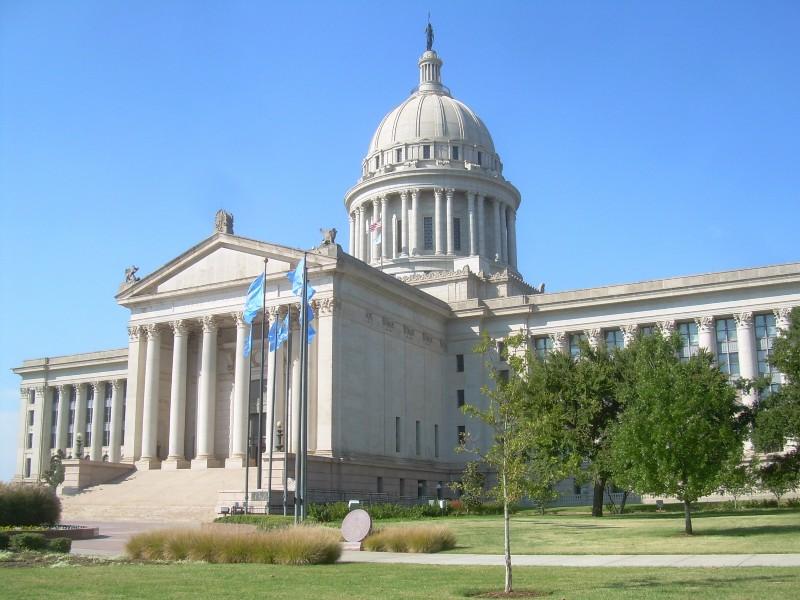Oklahoma Sheriffs Prepare for a Showdown Over Criminal Justice Reform
Will the state with the second highest incarceration rate get its act together?

Oklahoma had the second highest incarceration rate in the nation in 2014,and the number of people shepherded into its prisons and jails has continued to grow since. In April, the number of people under the supervision of the state’s Department of Corrections hit a record high of 62,000, with state prisons filled to the brim. Confronted with this grim reality, it has become clear to Republicans and Democrats that there is an urgent, dire need for reform. But in order to advance legislation, which now has bipartisan support from legislators, the governor, and constituents alike, lawmakers have to contend with members of the law enforcement community — who refuse to let bills pass without a fight.
Last Thursday, the same day Attorney General Jeff Sessions delivered a speech to the state’s sheriffs about the national and state “crime problem,” the leader of the Oklahoma Sheriffs’ Association called on his colleagues to brace for a major legislative battle in the near future. “This is going to be probably one of the biggest defensive years that this association has ever had,” Executive Director Ray McNair said. He referenced potential cuts to fines and fees and efforts to turn certain felonies into misdemeanor offenses. “You have no idea the importance of being out at that Capitol.”
McNair’s plea to foil reform efforts was echoed by Rep. Scott Biggs (R), chair of Oklahoma’s judiciary committee. Noting their experiences with crime and sentencing, Biggs asked sheriffs to mobilize and pressure legislators to say no to reform. “Ladies and gentlemen, this is an issue. This is a fight that is not going away,” he said. “But would you believe the Governor and her DOC director want to reduce penalties and early release for those individuals who disgrace the American flag. I don’t think that’s something that Oklahoma really, truly believes in, but that’s something they want to do.”
In many ways, the problems with Oklahoma’s criminal justice system mirror the problems detailed in every state grappling with mass incarceration. Detention facilities are teeming with people who come from poverty and communities of color and who were charged or convicted for low-level offenses. In December 2016, the Greater Oklahoma City Chamber Criminal Justice Reform Task Force reported that Oklahoma County, home of the state’s largest municipality, Oklahoma City, housed 2,581 people in a jail designed to hold 1,200. Many people who hadn’t been found guilty of a crime were too poor to make bail and were coping with substance abuse and mental illness. The Task Force concluded that drug and alcohol offenses accounted for the majority of felony, misdemeanor, and municipal charges that people were locked up for.
Statewide, criminal statutes have classified hundreds of minor offenses as felonies that lead to draconian sentences, with an average of 26 new crimes established annually from 2010 and 2015. But according to Brad Henderson, legal director of the ACLU of Oklahoma, growth in the state’s carceral population isn’t a new phenomenon driven by recent legislation. Rather, it is a trend that has been ongoing since the 1990s. The current bloated system can be attributed to outdated tough-on-crime policies, he says.
“The impact of things like mandatory minimums, truth in sentencing — the so-called three strikes you’re out rule — can be exponential,” Henderson told In Justice Today. “You end up with people who suddenly are going in for longer and longer sentences. And those sentences are stacking on top of each other.”
Within the past two years, state lawmakers and constituents on both sides of the aisle have recognized a need for reform. Last November, voters passed SQ 780 and SQ 781, public referendums that reclassified simple drug possession and low-level property offenses as misdemeanors instead of felonies, and provided funding for rehabilitative services. Both went into effect in July. But the victory was coupled with a major legislative defeat in May. Multiple reform bills that had large-scale bipartisan support failed to pass, forcing lawmakers to try again next year. “These [were] bills that were trying to ratchet down very bad over-incarceration policies that we’ve had for years,” Henderson said.
Biggs, the very same legislator calling on sheriffs to organize, is typically viewed as the culprit who stopped the bills dead in their tracks, earning McNair’s praise last week. As the leader of the judiciary, Biggs ultimately held the bills so they wouldn’t come to a floor vote, where they were likely to pass. But Biggs didn’t act alone, Henderson says. The House speaker or president pro tempore are authorized to circumvent chairmen who use their power to hold up the passage of legislation. But they didn’t.
Regardless of who is responsible for the past, sheriffs vowing to fight new bills could complicate reform in the future. In many other local legislative battles, law enforcement groups — representing hundreds and thousands of sheriffs, police officers, and prosecutors — have successfully lobbied politicians to block a wide range of reforms that had bipartisan support.
It is too early to say how many sheriffs will support the call to action, and the extent to which they will pressure lawmakers. But if McNair gets his way, every member of the association will fall in line. “We can’t have the same 10 or 11 people show up at the Capitol,” he said. “What we do out at the Capitol affects all 77 sheriffs.”
